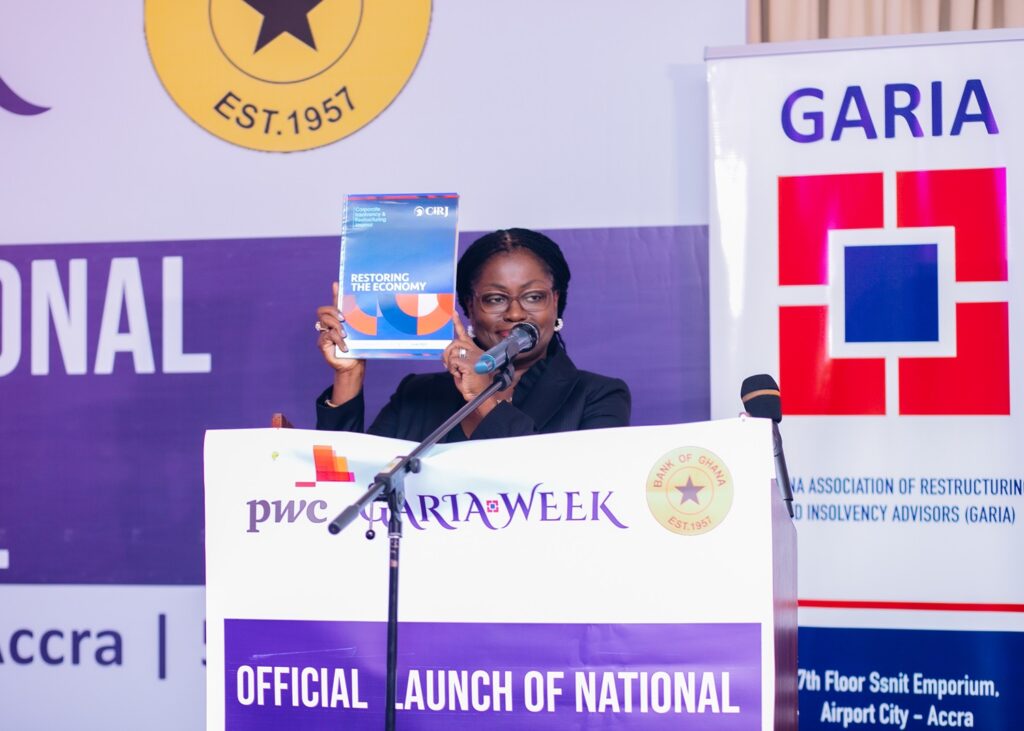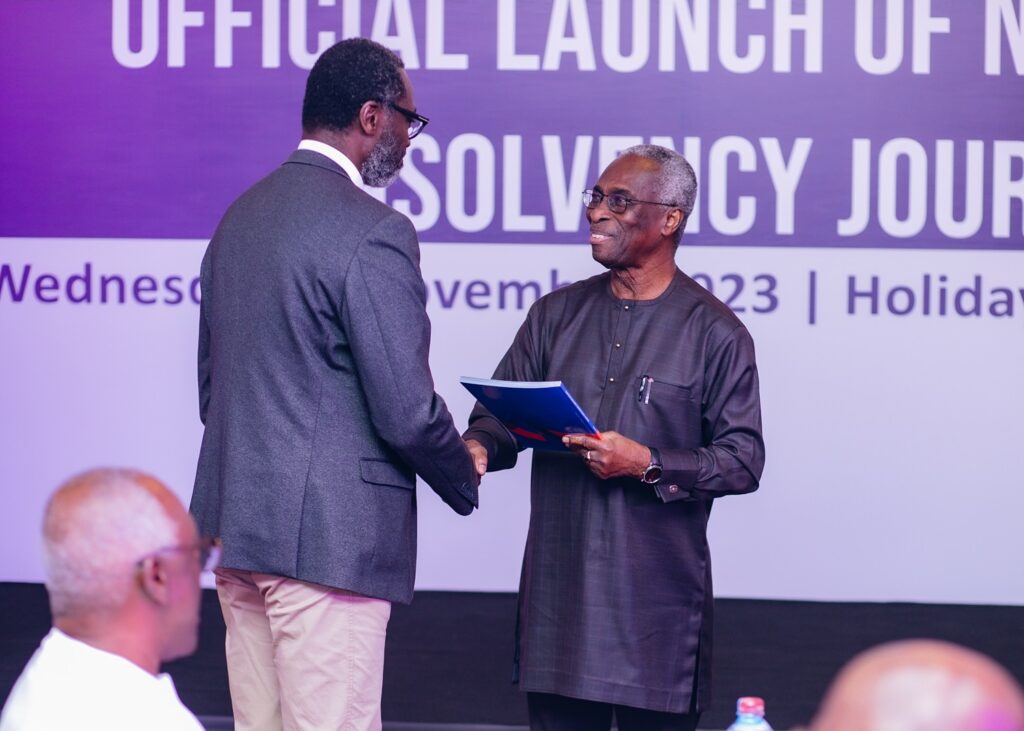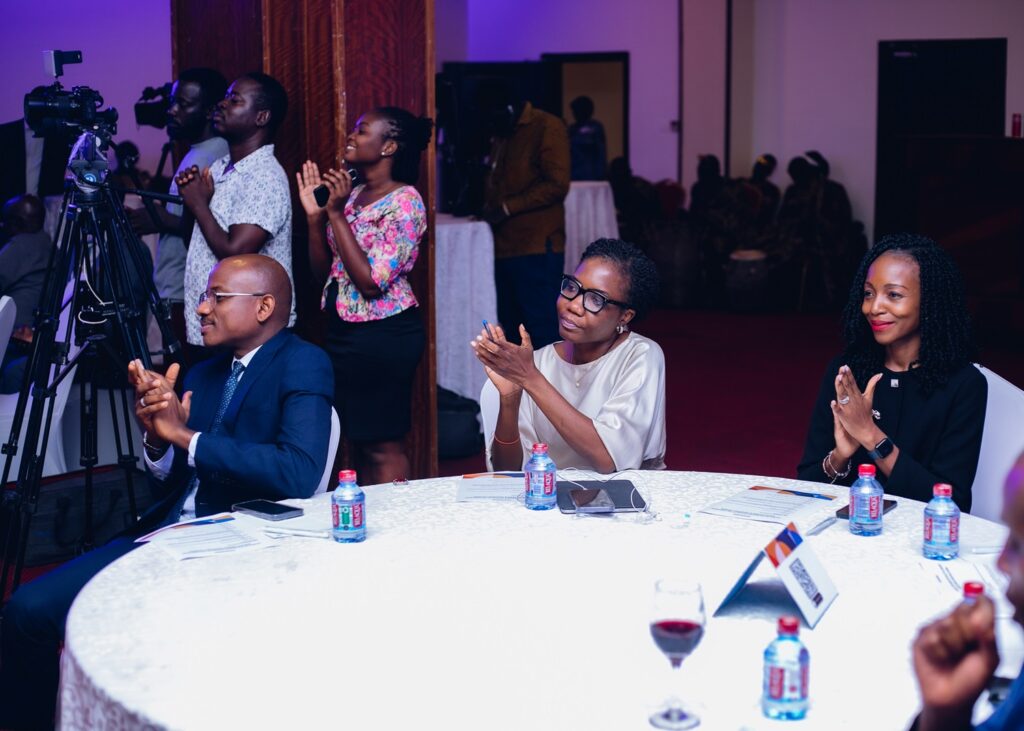The Ghana Association of Restructuring and Insolvency Advisors (GARIA) has unveiled the maiden edition of the Corporate Insolvency and Restructuring Journal, marking a significant step forward in enhancing thought leadership in the business framework space in Ghana.
Ghana’s journey towards an improved business environment has been punctuated by key legislative milestones, including the enactment of the Companies Act in 2019 and the Corporate Insolvency and Restructuring Act in 2020, of which GARIA has been at the forefront of advocacy, with the support by the Office of the Attorney-General and Ministry of Trade and Industry, various development and foundation partners and corporates.
This historic launch which kicks-off GARIA celebrations comprising seminars, workshop and a Gala Presidential Awards Night on 11 November 2023 is a testament to Ghana’s commitment to fostering a more robust and supportive business environment through education, research, and advocacy in the field of corporate insolvency and restructuring. The journal is poised to play a pivotal role in shaping the future of Ghana’s corporate insolvency and restructuring landscape.
Elsie Addo Awadzi, Editor-In-Chief of the Maiden Journal and 2nd Deputy Governor of the Bank of Ghana in launching the Journal in Accra yesterday, noted that GARIA is privileged under the Corporate Insolvency and Restructuring Act, 2020 (ACT 1015) to be recognised as the professional body for insolvency practitioners.

“I felt that the next step would be for GARIA to start a mouthpiece for intellectual discourse, for intellectual workmanship in terms of helping to develop our jurisprudence and our practice in this area.”
She emphasized the importance of this journal in shaping a more supportive culture of business rescues and restructuring in Ghana and noted that the Corporate Insolvency and Restructuring Journal is not supposed to be a law journal but a multidisciplinary publication designed to stimulate discussions and incubate ideas to strengthen Ghana’s insolvency and restructuring industry. It also aims to shape policy, legislation, and jurisprudential underpinnings of the market-based economy in the country.
George Fosu, CEO of GARIA, shared insights into the significance of the Corporate Insolvency and Restructuring Journal. He stated, “The then Companies Act 1963 (Act 179) was quite inadequate to address the trajectory that Ghana was on in the context of its integration into the global economy. The Companies Act and the Official Liquidation Bodies Corporate Act, 1963 (Act 180) provisions did not provide any room for resuscitating businesses that were viable but had incurred some sort of financial distress.”

Mr. Fosu also emphasized the journal’s role in simplifying complex concepts and making them accessible to a broader audience, ensuring maximum readership and benefit.
Mr. Felix Addo, President of GARIA, reflected on the Association’s journey since 2006, stating, “We’ve come a long way since 2006, and it’s a momentous occasion. Tonight, we have a diverse audience, including lawyers, members of the judiciary, accountants, bankers and others. Our focus is on restructuring distressed companies at the company level.”
He highlighted the distinction between restructuring at the national or souvereign level and the GARIA’S focus on helping distressed companies.
Professor Emeritus Albert Fiadjoe, Chairman of the launch of the maiden edition of the Corporate Insolvency and Restructuring Journal, underscored the importance of education, training, research, and advocacy in promoting business rescue practice. He praised the enthusiastic support received from GARIA members and the editorial board for establishing the journal.
The Corporate Insolvency and Restructuring Journal’s keynote speaker, Professor Philip Ebow Bondzi-Simpson, Vice Chancellor of the Methodist University, and former Dean of the University of Cape Coast Business School and Rector of GIMPA, emphasized the necessity of corporate solvency and restructuring for corporate entities facing financial distress. He discussed the legal framework, capacity building for practitioners, and the importance of a platform for knowledge sharing.

Prof. Bondzi-Simpson commended the journal for its role in educating laypersons and business practitioners about sound practices and current trends. He noted that the journal’s capacity-building aspect would clarify roles, regulations, and needs of qualified solvency practitioners.
The inaugural edition of the Corporate Insolvency and Restructuring Journal features 11 high-quality articles contributed by eminent academics, practitioners, jurists, and experts from Ghana, Canada, Nigeria, and South Africa. These articles cover a wide range of insolvency and restructuring-related topics and are designed to be accessible to a broad audience, including students, practitioners, professionals, and researchers.
The Journal is intended to be published bi-annually.

Are you enjoying your time on JBKlutse?
Articles like these are sponsored free for everyone through the support of generous readers just like you. Thanks to their partnership in our mission, we reach more than 50,000 unique users monthly!
Please help us continue to bring the tech narrative to people everywhere through relevant and simple tech news, reviews, buying guides, and more.
Support JBKkutse with a gift today!